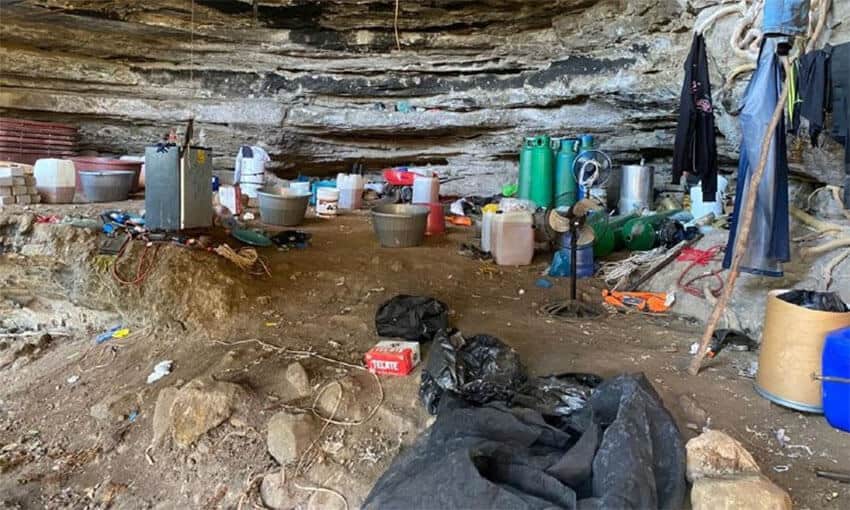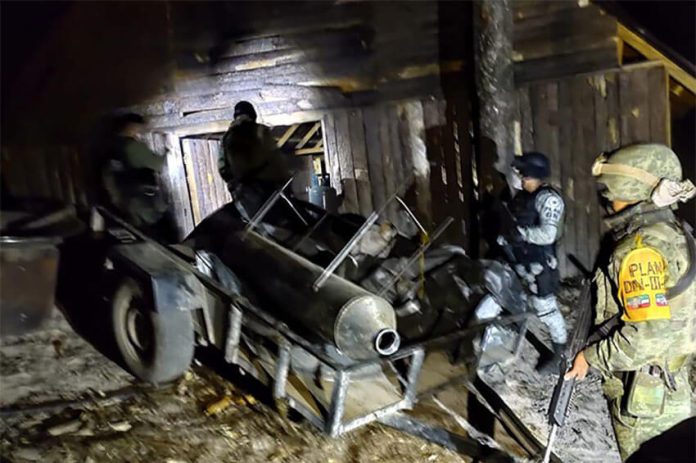The army has shut down 23 narco-labs in Michoacán since 2018, over half of which were found in the state’s notoriously violent Tierra Caliente region.
The detection and seizure of the synthetic drug laboratories occurred in a period of almost 4 1/2 years to April 30, 2022, according to information from the Ministry of National Defense (Sedena).
The newspaper Milenio, which obtained the Sedena data via a freedom of information request, reported that most of the dismantled labs were making fentanyl, a potent synthetic opioid that Mexican criminal groups make with precursor chemicals from Asia that are smuggled into the country via Pacific coast ports.
It also said that the people who operate the labs have usually fled by the time the authorities arrive.
Five of the 23 labs were located in Buenavista Tomatlán, a Tierra Caliente municipality on the border with Jalisco.
The Jalisco New Generation Cartel (CJNG), one of Mexico’s most powerful criminal organizations, and the Cárteles Unidos, a criminal alliance led by Los Viagras, are engaged in a war over control of Michoacán’s Tierra Caliente region, which is made up of 17 municipalities. Other criminal organizations, such as the Nueva Familia Michoacana, also operate in the state.
After Buenavista – one of several Tierra Caliente municipalities where improvised explosive devices laid by the CJNG have been detected in recent months – the highest number of narco-lab seizures occurred in Parácuaro, with four.
It borders Múgica, where soldiers were forced off a checkpoint by presumed cartel henchmen last week.

Sedena data also shows that the army shut down one lab in each of the Tierra Caliente municipalities of Huetamo, Coalcomán, Turicato and Apatzingán.
Milenio reported that the manufacture of illicit drugs also occurs in urban areas of Michoacán, one of Mexico’s most violent states. A narco-lab was detected in March 2021 in Acuitzio, a municipality that borders the state capital Morelia. Some 230 kilograms of chemicals used to manufacture synthetic drugs as well as drug-making paraphernalia were seized at the lab, which was located in the town of Páramo.
Illegal drugs have also been made in Uruapan, Michoacán’s second largest city.
The only state where more narco-labs have been dismantled in recent years is Sinaloa, home to the powerful Sinaloa Cartel.
Milenio reported that 53 labs where drugs such as fentanyl and methamphetamine were made have been shut down since 2018 in the northern state.
Citing Sedena data, the newspaper reported last December that the army dismantled 113 synthetic drug laboratories in the first 34 months after President López Obrador took office in late 2018 – a 70% decrease compared to the same period of Enrique Peña Nieto’s presidency.
It said Sunday that Jalisco ranked third for narco-lab seizures, adding that most were detected in two municipalities that border Michoacán’s Tierra Caliente.
Sinaloa, Michoacán and Jalisco are all Pacific coast states, meaning that precursor chemicals don’t have to travel far to reach clandestine fentanyl and meth factories. After manufacture, large quantities of the drugs are shipped to the Mexico-United States border via states such as Durango and Zacatecas, which has been described as a fentanyl nexus.
The synthetic opioid causes tens of thousands of overdose deaths annually in the United States.
A recent organized crime study that determined that Mexico has the fourth highest levels of criminality in the world acknowledged that Mexican cartels are involved in the production and transportation of drugs such as methamphetamine and fentanyl.
The Global Initiative Against Transnational Organized Crime, a Switzerland-based nongovernmental organization, also said that Mexico’s drug-trafficking organizations are among the most sophisticated mafia-style groups in the world.
With reports from Milenio
